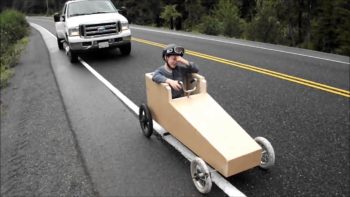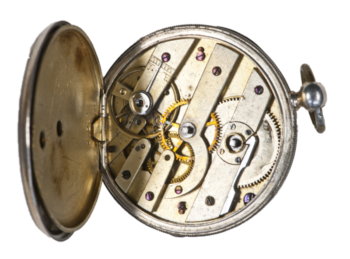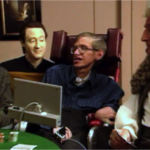The Car-Universe Without A Motor, part 2: Wheels That Turn Themselves
Imagine you had never seen either an automobile or a soapbox car before. You could be from a literate civilization of thousands of years ago, confronted with a time-travelling car–or you could be a present-day Amazon tribe member (some of whom are still isolated from modern civilization, from what I hear). You see a four-wheel device rumble past you and you wonder, “What makes the wheels turn? Could it be that the wheels just turn themselves? Or is something else making the wheels rotate?” (Granted, this might not be the first thing you’d think as a car rolled by for the first time, but you might think it eventually. 🙂 )

Two vehicles, one with and one without a motor.
In this scenario, you don’t get the chance to put your hands on the automobile or soapbox car–it rolled by and you are dealing with the memory of its passing. You can’t actually look for the motor and put your eyes on it. But can you deduce that a motor must exist, even if you cannot see it directly? (Yes–if the vehicle freely went uphill, it had a motor. If it could only move downhill, it might have had one, but it didn’t need one for the wheels to turn.)
Please note what this analogy is about and what it isn’t about.

Photo credit: Hannes Grobe
A well-known analogy is called the Watchmaker Analogy. In that device used to present the concept of intelligent design (perhaps I should capitalize that to Intelligent Design), a person finds a watch in an isolated place and can deduce that the watch has a designer, because it clearly has design.
While I believe that analogy has some validity (note that both Isaac Newton himself and Renee Descartes thought so), I don’t mean to repeat it. I wish I could have picked something better than a car for my analogy, because I would be perfectly fine with something that isn’t a clear-cut piece of technology. I considered using a-stone-rolling-downhill-naturally verses a-stone-that’s-being-pushed. But the problem is stones don’t always roll that smoothly, which I think would obscure part of my point. The point I’m making relates to the apparent nature of the universe smoothly running itself–in terms of tumbling stones, is that like a rock rolling downhill by itself? Or is it like a rock rolling uphill because some force pushed it?

Soapbox cars racing.
I find that a car rolling downhill with the motor turned off or a soapbox car is much more familiar to most modern people–we are very aware in a culture that drives automobiles that the motor is not needed to turn the wheels to go downhill. But is required for the wheels to go uphill.
So this is really an analogy about inertia when talking about the rolling car. Does the universe have an inertia such that if were to have started out at the Big Bang with the right initial conditions–and by “right” I mean the conditions posited by mainstream modern science–that it would naturally “run downhill” to the conditions that we see today? Is the universe like a soapbox car in that sense?
Inertia is not the really right term for this way of looking at the universe, though of course inertia matters in the expansion of the universe from the Big Bang itself. Thermodynamics plays a big role in what I’m going to talk about as well, as does what particle physicists call “naturalness,” for which they mean (in my own paraphrase) that “natural” physical parameters should have an underlying cause and should not require a great deal of what they call “fine tuning.” (Eventually I will circle around to talking about design in relation to the topic of naturalness, but not for a while and it’s not my main point.)
Note that since the days of Isaac Newton, who revealed that laws under-gird the ordinary operations of the observed universe and can explain cosmic motions (with no direct Divine intervention required), theists who believe in God’s creation of the universe have often retreated to describing God as the “prime mover.” That is, God gave the universe the first push to get started (so to speak), but since then, it’s been running itself. Though of course not all theists have held this view–many have always held to the idea that God’s intervention in nature went beyond just the initial “push.”
However, many theists have in effect believed in a universe that moves itself since the days of Newton–though the idea of a prime mover goes back to Aristotle (where his reasoning led him to posit a monotheistic creator, in spite of the Paganism of his time). Or to take this back to the Watchmaker Analogy, those who posit that analogy in effect concede that, yes, the watch hands move themselves (symbolizing the current operations of the universe by the laws of physics), but only because God designed the watch and wound it up, back at the beginning of time.
What I intend to show in this series is that what science has discovered about the universe since the days of Newton does not in fact support the idea that the universe has simply naturally run downhill from where it first started. The “watch” does not in fact simply run smoothly after having been wound up. There have been some steep uphill slopes along the way–some events that do not support the idea of the universe simply running itself off of known laws of physics (the laws simply doing what they normally do).
Note that this series intends to treat modern science as valid and correct (I say “intends” because it is always possible I could misrepresent science via human error–though I’m going to carefully avoid errors as best I can). It will not, at least not at first (and never as a main focus), challenge the standard ideas about the age of the universe–it will begin by presuming a Big Bang 13.8 billion years ago. It will presume observations made by astronomers and physicists are essentially correct, though the way they interpret or present their own facts is often incorrect (i.e. they often do not discuss or perhaps understand the implications of their own discoveries).
The observations of modern science, perhaps surprisingly, do not in fact add up to a universe “naturally” flowing from simple principles, running downhill like a soapbox car. Seeing this doesn’t require challenging scientific insights as invalid. This is true even if one accepts modern scientific discoveries as valid, whether for the sake of argument or not.
In fact, the universe did the equivalent of running up several very steep hills to get to where we are today. The universe is not natural, if I can borrow the term used by particle physicists and expand its meaning a bit. The universe did not flow from simple first principles inevitably to where we are today via a process of time and evolution. It shows plenty of “fine tuning”–and I mean by this to question the universe as we know it generating itself in the way science commonly tells us it generated itself. Because what we started with, even accepting standard scientific premises, does not “naturally” lead to where we are now.
The wheels of our “car-universe” do not turn themselves uphill on their own. It’s not in the nature of wheels to do so. That is, the universe should not have been able to generate itself in the way that it is stated to have done by modern science. Something is missing.
To give just one preview of why not, why the universe would have to “run uphill” to come into being–the universe should not have been able to expand from the pre-Big Bang “cosmic egg” without forming initial massive singularities (yes, this information comes from a mainstream mathematician, not from a crackpot). In contrast to the very low entropy state that in standard cosmology led to stars and galaxies, the Big Bang (as commonly described) should have generated clusters of black holes (this is just the first of a number of “hills” this series will discuss).
I regret this post is in effect a second introduction to the series, but it was necessary. I wasn’t able to fully set the stage the last time. I hope it’s clearer now what I mean by calling on readers to imagine the universe as car.
There’s ample cause to deduce a motor in the machinery of the universe. Not just a prime mover who gave one push and nothing more, but a mover who the best available evidence indicates moved on multiple occasions in the formation of all that exists–which implies it (or He) is still capable of motion today.






































(computer voice announcing: English degree auto-engaged)
If you turned this into me as a paper, I’d tell you to cut about half of it, ’cause this is a lot of splashing without much actual swimming. Ideally this should have been combined with your intro post. But seriously thank you for defining your parameters about what you’re trying to accomplish (i.e., not any kind of tedious anti-science junk).
More on-topic: Stephen Hawking said at some point that black holes do not exist, which most likely translates into lay-people speak as “those things we call black holes do not follow the current rules we have laid out for black holes.” I guess scientists like to be melodramatic, too.
But science is supposed to be self-correcting rather than dogmatic. I get that some scientists act like it’s dogmatic, but besides human stubbornness, I imagine a lot of it is due to being fed up with Dunning-Kruger types who try to engage them with exasperatingly flawed understandings of their field (and/or reality in general. There are WEIRD people out there, y’all.)
Fortunately you are not my English teacher.
I wind up being a bit redundant because I’m trying to be sure to be clear, while at the same time being nuanced about what I actually mean. I have trouble being pithy when pursuing both goals. Perhaps you would not have any such trouble.
I can only offer an honestly half-hearted apology about that–half sorry because I don’t want my prose to be boring, half not sorry because this isn’t a simple topic and I’m doing my best. This series will stand or fall on the ideas it presents anyway and not my prose style.
As for what I think about how scientists act, I think from your comment on the topic that I understand scientists better than you do. There are many dogmatic scientists, nor is science entirely self-correcting, but of course a large number of scientists are willing to listen to evidence that contradicts their presumptions–and in general, science learns and progresses over time in most but not all areas.
As for the Dunning-Kruger effect, I don’t think that applies to me on this topic. But keep reading–perhaps you’ll be certain it did once you come to the end of the series.
Or maybe you’ll be surprised.
Science and religion probably have more in common than people would like to think, at least in terms of the positive and negative affects those things have. Science and religion both have things they are supposed to accomplish, rules that people are supposed to follow when people participate in those things, etc. But people, being people, often completely deviate from what science or a particular religion is supposed to accomplish, and thus both institutions end up being a bit mutilated by human behavior.
It’s almost as if you’re saying the universe has a mechanic of sorts. But forgive me, Travis. I give women a bad name because cars are wonderful feats of engineering that require a fluid called gas and something about changing the oil. I’m almost old-school in the idea of a car being ‘a man’s thing’ .
But I’m enjoying this!
Thank you, Parker!